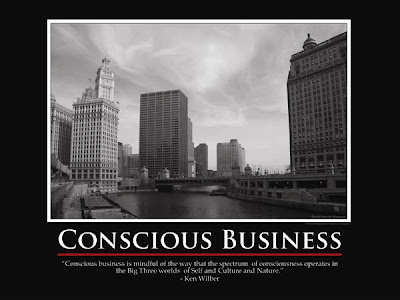At Integration Training we both use and train these matters in our leadership, stress management and conflict resolution courses.
……….
Conscious Business
Conscious businesses yield above average returns, because they practice principles which in the long run serve not only the bottom line, but also the relationships between, and integrity of employees. Fred Kofman, co-founder and president of Axialent and internationally acclaimed speaker, uncovers seven principles of conscious business: fundamental human principles which can be practiced daily and which are at the heart of personal leadership.
Unconditional responsibility
Response-ability refers to the ability to respond to a situation. It is unconditional in the sense that, no matter how little influence you have on a situation you are confronted with, there is always a degree of freedom in how you choose to deal with it.
In organizations, the success of your actions is largely evaluated in terms of the results you achieve. Essential integrity adds a criterion, which is the degree to which your actions are an expression of your fundamental values. The higher the alignment between actions and values, the larger is the degree of integrity.
Ontological humility refers to the recognition that you have no special claim to truth, and that the views of others are to be respected and considered. This attitude is opposed to ‘ontological arrogance’: ‘my truth is the only truth’. Although it may seem obvious that people have different perspective, most of us don’t act on this understanding, particularly in situations of disagreement or conflict.
The challenge of communication is sharing difficult information in an authentic and respectful manner, in alignment with your fundamental values. Communicating in this way deepens your relationships and improves your performance (and that of the organization). In order to understand the challenge of authentic ommunication: how would you tell a colleague that you think his/her proposal is a very bad idea, in a way which will help both of you to move forward?
Constructive negotiation
Constructive negotiation is an approach to conflict management which is based on the attitude of mutual learning. It deals with three aspects of conflict: the topic (decision-making), the relationship (mutual respect), and the integrity of both individuals. Constructive negotiation allows all of the involved to orient themselves toward ‘winning with’ the other(s), instead of ‘winning from’ the other(s).
The challenge of good coordination is facing up to and keeping commitments in the context of uncertainty and change. This means you can ‘count on each other’. When this is not (entirely) the case, an organization falls into a vicious circle in which existing commitments fail to be kept, causing new commitments to be made which couldn’t possibly be kept in the first place.
Emotional mastery refers to the art of continuously acting consciously and in full alignment with your values, even while confronted with stress. When the emotional circuit is strong enough, it can withstand high charges. When it is weak, intense emotions will blow the fuses, taking your conscious mind offline.
——————————————————————————–
Fred Kofman on organizational behaviors:
“Many organizations seem hell-bent on pretending that what is happening is not really happening. To survive, employees have to accept that they are not experiencing what they experience. This puts them in impossible contradictions. Furthermore, they have to act as if these contradictions don’t exist, which makes it impossible to discuss or change them. It is not surprising that stress and apathy run rampant. Repressing reality is at the core of mental illness.”
Tell the truth, but don’t bring bad news.
Take risks, but don’t make mistakes.
Be a team player, but what really counts is your individual performance.
Be creative, but don’t break the rules.
Promise only what you can deliver, but never say no to a request from your boss.
Follow all the rules above, but act as if none of them exist.
